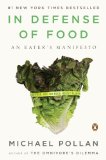After reading the Omnivore's Dilemna last year on my triup out to Halifax around this time last year I thought it was probably time to dive into another book on food. I figure one a year is about the right pace for me. Although after reading this book there were a few times where I figured that I should probably give up reading about food, outside of just getting a really cook books and going to work learning the dishes and techniques from yester-years cooking.
 In Defense of Food is a really interesting look at what nine tenths of the food in the grocery store is today and how we've been encouraged to give up the age old habit of cooking with raw food in favour of just warming up some pre-prepared meals in the microwave and calling it dinner. One of the central tenets of the book is that when reductionist science got applied to the food we eat, they succeeded in breaking it down into a series of bits and pieces called Nutrients and everyone was really happy. Because you could focus on the nutrients and there were guidelines that indicted that if you just got the correct amount of nutrients and you would be healthy. Unfortunately, the first pass of reductionist science missed spotting that viatmins were an important part of ones diet, and consequently some of the initial experiments with food science had some pretty bad results. How bad? Try baby food without vitamins. That's not good.
In Defense of Food is a really interesting look at what nine tenths of the food in the grocery store is today and how we've been encouraged to give up the age old habit of cooking with raw food in favour of just warming up some pre-prepared meals in the microwave and calling it dinner. One of the central tenets of the book is that when reductionist science got applied to the food we eat, they succeeded in breaking it down into a series of bits and pieces called Nutrients and everyone was really happy. Because you could focus on the nutrients and there were guidelines that indicted that if you just got the correct amount of nutrients and you would be healthy. Unfortunately, the first pass of reductionist science missed spotting that viatmins were an important part of ones diet, and consequently some of the initial experiments with food science had some pretty bad results. How bad? Try baby food without vitamins. That's not good.
The book moves on to highlight a short history of nutritionist thought since it's inception. How the sweeping tide of current nutrionist science has painted one nutrient the bad guy and then shifted focus to another in the hopes of getting closer to keeping us healthy and in the consequently, helping creating processed food that does in fact make us healthy. There's definitely a link being drawn between, the people creating processed food and the folks who are doing the studies to determine what is healthy. If I understood correctly, one of the points which Pollan strives to make is that the science's understanding of what makes a body healthy is incomplete and the body has worked long and hard to deal effectively with the diet that had developed over centuries before we started processing food and breaking down and remodelling our foods after the current desires and fashions. In the face of this incomplete understanding of food and how it interacts with our bodies we are better off to trust in the food culture that has been developed over the centuries.
In Defense of Food turns it's eyes towards practical tips for what we should be eating. The short version of the punch line is written on the cover of the book. "Eat Food, Not Too Much. Mostly Plants" Then goes on to list a bunch of tips for how one might do this. Most of the tips are pretty simple, like shopping around the outside of the grocery store, actually taking the time to cook food and eating slowly. The tips serve as good reminders for what good eating looks like, and for the most part it reminded me of a lot of tasty dishes I haven't had in a while. I'm going to try to follow them as best as I can. I'm still not ready to become a herbivore, but I'm completely ready to become a "flexivore" and slow down my meat consumption to a more reasonable level.
There was tons of information in here that had me raising an eye brow, fat might not be all that bad for you, that was a big one. In spite of all the information floating around cough Atkins cough, which I generally consider to be nonesense. I have to confess going through this book that I feel more inclined to eat butter rather than margarine with its trans fat infused past. CAn't say I'm doing the book justice here, but suffice it to say I would recommend this book to anyone who is slightly interested in learning more about their food!